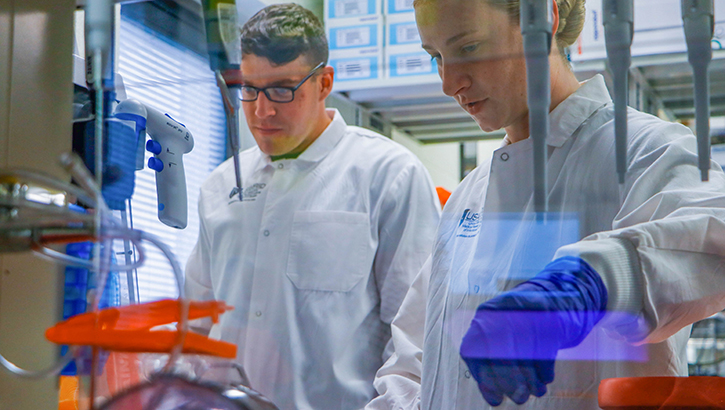USAMRIID Focuses on Genome Sequencing to Detect Variants
 U.S. Army Spc. Alexis Ouellette (R) vortexes reagents to create a homogenous mixture before passing them to U.S. Army Spc. Nolan Eubanks to add to samples at USAMRIID. The effort is part of the DOD SARS-CoV-2 Whole Genome Sequencing Action Plan, which brings together laboratories to conduct whole genome sequencing across the Military Health System in response to the COVID-19 pandemic. Photo by Timothy R. Butcher, USAMRIID VIO
U.S. Army Spc. Alexis Ouellette (R) vortexes reagents to create a homogenous mixture before passing them to U.S. Army Spc. Nolan Eubanks to add to samples at USAMRIID. The effort is part of the DOD SARS-CoV-2 Whole Genome Sequencing Action Plan, which brings together laboratories to conduct whole genome sequencing across the Military Health System in response to the COVID-19 pandemic. Photo by Timothy R. Butcher, USAMRIID VIO
Editor's note: This is the fourth article in a 7-part series that highlights the efforts of the Military Health System laboratories and technicians who worked to identify COVID-19 variants using special sequencing technology.
The U.S. Army Medical Research Institute of Infectious Diseases's Center for Genome Sciences played a key role in support during the COVID-19 pandemic.
The laboratory has consistently provided critical reagents, protocol development, and support for training in whole genome sequencing from the early phases of the pandemic to multiple stateside and overseas laboratories within the Armed Forces Health Surveillance Division Global Emerging Infections network.
Their support for early shipboard outbreak investigations and provision of support for viral culture and isolation has also been an important part of the Department of Defense's response during the COVID-19 pandemic. Notably, USAMRIID also played a key role in building sequencing capabilities at Tripler Army Medical Center in Hawaii by providing assistance to their laboratory over the past two and a half years.
This support was critical to the mission during the height of the COVID-19 pandemic.
"As new sequencing activities came online to surge to meet the need, and existing sequencing capabilities experienced turnover from burn-out or competition in a fierce labor market, the reach-back laboratories like USAMRIID provided the necessary subject matter expertise for the network to stay functional," said U.S. Army Maj. Jeffrey R. Kugelman. "As a reach-back capability, USAMRIID provides the necessary subject matter expertise to explain what results mean and assists with quality control for determining contamination versus a new lineage call. We also act as surge capacity to the network. Throughout the outbreak, we have sequenced thousands of samples from Military Health System beneficiaries."
The team provided remote and in-person assistance to various labs.
“We typically perform several site visits to assist in training personnel, provide custom software for analysis, and perform confirmatory sequencing on several samples to demonstrate that the laboratory is capable of performing whole genome sequencing to standard,” said Kugelman. “The two major complications we encountered during the pandemic were the difficulties of moving large data sets up to the gigabyte range, and the limitations of virtual training tools for a hands-on activity such as sequencing.”
In the past, the CGS team would travel to the outbreak. However, due to the pandemic, their support was complicated by travel restrictions. It was important to belong to a connected family of laboratories across the MHS.
“GEIS published the ‘SARS-CoV-2 Whole Genome Action Plan for the DOD Military Health System,’ which delineated the process for GEIS sequencing support of the COVID-19 response. Thanks to this coordinating document, USAMRIID could accept samples and provide support across the DOD for COVID-19 variant characterization without the delays often seen with standard material transfer agreements,” said Kugelman.
As a part of the GEIS Network, “This collaborative framework transformed a loose and disparate collection of cross-service labs into a unified sequencing response, which collectively sequenced tens of thousands of patient samples throughout the outbreak,” he added.
This work is important to military and local civilian populations.
“Simply put, sequencing can provide commanders with information on what, when, and how a pathogen is circulating in their area of operation and community. This information is critical as a planning factor to maintain readiness through force health protection measures and to develop the necessary medical countermeasures,” Kugelman said. “Over 20 technicians and scientists, both soldiers and civilians, supported this effort over a two-and-a-half-year period. They worked long hours under considerable stress to provide support to the DOD, and I am honored by their efforts and excellence.”